#consuming hydrating foods like fruits and vegetables
Text
Stay Hydrated: Essential Tips to Prevent Dehydration for Optimal Health
Hydration to prevent dehydration refers to the process of consuming adequate amounts of fluids, primarily water, to maintain the body’s fluid balance and prevent the physical condition of dehydration. Dehydration occurs when the body loses more fluids than it takes in, leading to an imbalance in the body’s electrolytes, which are essential for normal function of the body. Therefore, regular…

View On WordPress
#avoiding direct sunlight during peak hours#avoiding excessive caffeine and alcohol#consuming hydrating foods like fruits and vegetables#Drinking plenty of water#drinking water even when not feeling thirsty#increasing fluid intake when ill or experiencing fever#replenishing electrolytes during intense physical activity#staying cool in hot weather#wearing appropriate clothing for the weather
0 notes
Text
THE ULTIMATE SUMMER GLOW UP GUIDE
Wanna glow up this summer? Here are some few tips I’ve put down for y’all to help everyone of y’all have the best summer ever. You’re welcome girlies 🥹💗🫶🏻
Skincare
1. Hydration
- Drink plenty of water.
- Use hydrating serums and moisturizers.
- Apply a hydrating mask weekly.
2. Sun Protection
- Use broad-spectrum SPF 30+ daily.
- Reapply sunscreen every 2 hours.
- Wear protective clothing and hats.
3. Cleansing
- Double cleanse at night.
- Use a gentle, hydrating cleanser.
- Exfoliate 1-2 times a week.
4. Targeted Treatments
- Use vitamin C serum in the morning.
- Apply retinoids at night (if not too sensitive).
- Incorporate a hyaluronic acid serum.
Haircare
1. Hydration and Protection
- Use a leave-in conditioner.
- Apply a heat protectant before styling.
- Wear hats or use UV protection sprays.
2. Styling
- Embrace natural textures.
- Avoid excessive heat styling.
- Use lightweight, non-greasy products.
3. Maintenance
- Get regular trims.
- Deep condition weekly.
- Use a clarifying shampoo once a month.
Nutrition
1. Hydration
- Drink at least 8 glasses of water a day.
- Consume water-rich foods (fruits and vegetables).
- Limit caffeine and alcohol intake.
2. Balanced Diet
- Eat plenty of fresh fruits and vegetables.
- Incorporate lean proteins and whole grains.
- Limit processed foods and sugars.
3. Supplements
- Consider taking a multivitamin.
- Use omega-3 supplements.
- Incorporate probiotics for gut health.
Fitness
1. Cardio
- Engage in at least 150 minutes of moderate-intensity cardio per week.
- Try activities like swimming, running, or cycling.
- Include interval training for variety.
2. Strength Training
- Do strength training exercises 2-3 times a week.
- Focus on all major muscle groups.
- Incorporate bodyweight exercises like squats and push-ups.
3. Flexibility
- Stretch daily or after workouts.
- Consider yoga or Pilates classes.
- Focus on full-body stretches.
Mental Wellbeing
1. Mindfulness
- Practice meditation or deep breathing exercises.
- Keep a journal for reflection.
- Spend time in nature.
2. Stress Management
- Engage in hobbies or activities you enjoy.
- Set aside time for relaxation.
- Connect with friends and family.
3. Sleep
- Aim for 7-9 hours of sleep per night.
- Establish a regular sleep schedule.
- Create a calming bedtime routine.
Fashion
1. Wardrobe Essentials
- Invest in versatile summer pieces (e.g., sundresses, shorts).
- Choose breathable fabrics like cotton and linen.
- Opt for light and bright colors.
2. Accessories
- Use statement sunglasses and hats.
- Incorporate light scarves and jewelry.
- Carry a stylish yet functional bag.
3. Footwear
- Wear comfortable yet stylish sandals.
- Opt for breathable sneakers.
- Ensure proper foot care with pedicures.


#beauty#fashion#hyper feminine#light feminine#pink moodboard#pink pilates princess#soft moodboard#that girl#beautytips#confidence#health tips#summer#wonyoungism#wonyoung#soft girl#girly tumblr#girly aesthetic#girly blog#it girl#girlblogging#spoiled girlfriend
160 notes
·
View notes
Text
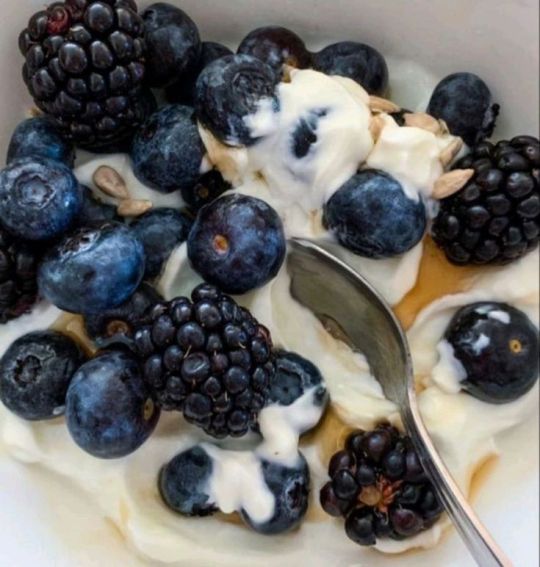
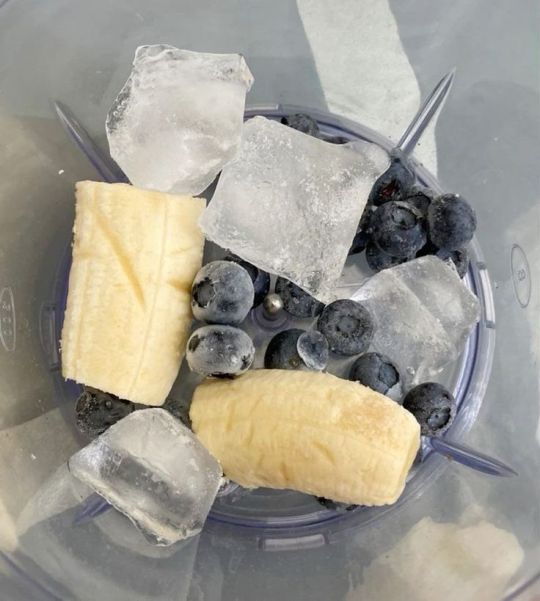
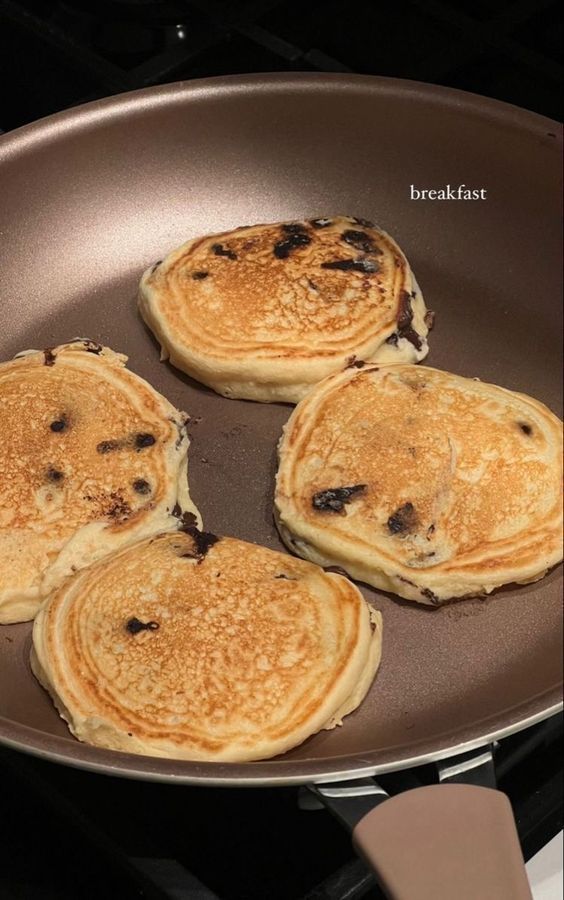
the effect of what (and how) you eat
okay, this is a big topic. and so this is a long post. i'm going to be going over the effect of what you eat and why it's important to think about what foods you are consuming. don't worry! i do my research-- at the end of the post will be a few resources, and i'll show where i've gotten my information.
lots of dietary advice is available over the internet, but often the people absorbing the information do not understand the why. knowing where your information is coming from,, and not believing everything you read online is key to actually maintaining a good, healthy diet.
before you read: TRIGGER WARNING THERE IS MENTION OF EATING DISORDERS,,
let's start with this: like everything in this age, food is a double-edged sword. overconsumption and underconsumption can both kill you. what you eat; how you eat--it can help or hinder whatever your goals may be.
here's the effect/s: the connection between diet and mental health is profound. while we’ve long understood that diet plays a crucial role in overall health, emerging research in the field of nutritional psychiatry sheds light on how what we eat directly impacts our emotional well-being and mental state.
the brain-gut connection: the gut is closely linked to the brain. trillions of living microbes in our gut have essential functions, including synthesizing neurotransmitters. these neurotransmitters send chemical messages to the brain, regulating sleep, pain, appetite, mood, and emotions.
to improve your gut health, here's what you can do:
by eating a varied diet that includes fruits, vegetables, whole grains, nuts and seeds, essential nutrients are provided which feeds the beneficial bacteria in the gut. high fibre foods promote gut health by supporting good bacteria.
fermented foods, such as yogurt, kefir, sauerkraut, kimchi, and miso are rich in probiotics—live beneficial bacteria that boost gut health. kombucha (a fermented tea) is another option.
avoiding reducing processed foods can reduce the diversity of good bacteria in your gut. when i say processed foods, i'm referring to ultra-processed foods, for example, fried foods and frozen meals. they may be easy and cheap, but they include preservatives, artificial colouring, chemical flavouring and texturing agents. all of which our bodies are not made to consume.
it's ignorant to tell you to avoid processed foods at all costs. that's not realistic, and a horrible mindset. instead, you should manage your intake. enjoy treats every now and then and don't punish yourself for it.
hydration is key to a healthy gut. water supports digestion and nutrient absorption.
stress management, eating well and exercise can also help your gut microbiome's health.
by having a healthy gut microbiome, you are helping your body to have lower chronic inflammation, have regular bowel movements and more effectively absorb nutrients. therefore, you will have a stronger immune system, have clearer skin and support your digestion and metabolism.
why eating protein matters: proteins are made of amino acids, which serve as the fundamental building blocks for various structures in our bodies. these amino acids are essential for forming enzymes, hormones, tissues, and DNA. protein is vital in maintaining and building muscle mass. when activities like strength training and physical exercise are engaged in, protein helps build and repair the muscles.
hemoglobin, a protein in our red blood cells, transports oxygen from our lungs to other tissues. without adequate protein, oxygen delivery would be compromised. antibodies, which defend against infections, are made of proteins. a well-functioning immune system relies on sufficient protein intake. collagen, a protein, maintains the integrity of our skin, hair, and nails. adequate protein supports healthy skin elasticity and wound healing.
the recommended dietary intake for protein relies on factors such as age, weight, height, gender, activity and overall health. remember that individual needs can vary, so consulting with a healthcare provider or registered dietitian is advisable to determine your specific protein requirements.
many diets exist that cut out entire macronutrients (keto for example) but that is not the way. each macronutrient has great importance in helping the body function.
carbohydrates are the body's (including the brain) preferred energy source. they enable muscle contraction during exercise and even at rest. carbs maintain body temperature, support heart function, and aid digestion.
the keto diet comes from the belief that when carbohydrates are not providing energy (are not being consumed), the body will use reserved energy stored in lipids (fat). while this is true, this diet is not maintainable-- it throws the body out of whack, storing more energy to maintain homeostasis.
fats provide energy and are essential for hormone production. they contribute to cell growth, brain health and vitamin absorption.
our brain is composed of ~60% fat. fats are essential for neurotransmitter production, affecting mood, cognition, and hormonal signalling. cholesterol, often associated with heart health, is a precursor for steroid hormones (testosterone, estrogen, progesterone). without adequate cholesterol, our body cannot produce these essential hormones.
effects of diet on mood: firstly, going long periods without eating can cause a drop in blood sugar levels, leading to tiredness and irritability. secondly, consuming excessive amounts of food can make you feel tired and lethargic.
choosing the right carbohydrates can help maintain blood sugar levels. our brain primarily runs on glucose (obtained from carbohydrate-rich foods). you can opt for slow-release carbohydrates to maintain steady energy levels. slow-release carbohydrates (a.k.a low GI food) provide a more sustained and gradual release of energy compared to other carbohydrates. examples include fruits, vegetables, whole grains (grainy bread, brown rice, oats) and sweet potatoes. high GI foods rapidly spike blood sugar levels due to their quick digestion and absorption.
going too long without eating can lead to low blood sugar levels, resulting in irritability and fatigue. overeating to discomfort can also leave you feeling tired and lethargic. consistent, moderate-sized meals help maintain stable blood sugar levels and promote an even mood.
i know, overeating is an issue that one cannot simply 'turn off'. it's important to know the psychology, and if you struggle with it--please talk to a health professional.
here is what i can tell you about overeating:
overeating is typically a learned behaviour and habit. certain foods are associated with pleasure and reward. when enticing food is encountered, we engage in eating behaviour and immediately experience pleasure. this reinforces the habit, making it challenging to change.
overeating may be serving as a coping mechanism for emotions. when feelings of sadness, disappointment, frustration, or even joy arise, someone may turn to food. emotional eating provides temporary relief, reinforcing the behaviour.
the first delicious bite triggers pleasure, satiates our appetite, and improves our emotional state. our memory associates this reward process with eating, leading us to continually seek that pleasure. this is due to immediate reward.
people with eating disorders may disregard their health, body, body image and lifestyle goals. they use food as a way to punish themselves and gain control over their life. restrictive eating disorders can lead to 'binging behaviour'. bingeing serves as a way to numb emotions. anxiety, stress, and depression can trigger binge behaviours. consuming certain foods or substances (like junk food or alcohol) releases dopamine, the “feel-good” neurotransmitter. this chemical rush can lead to physical addiction, reinforcing bingeing. a culture (unfortunately which is abundant in the world today) that emphasizes consumption as a measure of worth can contribute to bingeing. messages about thinness, drinking, and material possessions can drive these behaviours.
i hate that i am having to say this but alcoholism is bad. and caffeine addiction is bad. in no way is harming your health aesthetic or 'a vibe'.
limiting caffeine and alcohol can also improve mood. again, i'd like to stress that there is never going to be one perfect diet, and allowing yourself to enjoy whatever food you like is perfectly fine- as long as you are doing so in moderation.
everything is a balance.
resources/further reading, to end:
Fat Requirements For Optimal Hormonal Health - Clean HealthHow Dietary Fat Benefits Hormones - Women's International Pharmacy (womensinternational.com)
The truth about fats: the good, the bad, and the in-between - Harvard HealthDietary fats | healthdirectMacronutrients: Definition, importance, and food sources (medicalnewstoday.com)Know Your Macros-Why Macronutrients Are Key to Healthy Eating | Cedars-SinaiWhy the Proper Balance of Macronutrients is Vital for Good Health - Functional Diagnostic Nutrition
What Is Protein & Why Do You Need It? (eatingwell.com)Protein: Why Your Body Needs It (webmd.com)Protein | The Nutrition Source | Harvard T.H. Chan School of Public HealthBinge-Eating Disorder (Compulsive Overeating) | Psychology Today AustraliaThe Psychology Behind Binge-Watching | PsychregBingeing: Why It Happens and What You Can Do About It (greatist.com)
Understanding Overeating: The Psychology Behind It - Listen-HardWhy stress causes people to overeat - Harvard HealthThe Truth About Overeating | Psychology TodaySlow-release carbs list (medicalnewstoday.com)Why understanding carbs (and how to count them) matters | Diabetes UK
Food and your mood - Better Health ChannelHow food can affect your mood | Nutrition AustraliaStress-related stomach pain: When to see a doctor - UChicago MedicineWhat Is Gut Health? A Comprehensive Guide to Digestive Wellness | U.S. News (usnews.com)Why Gut Health Matters More Than You Think | Well.Org
Probiotics: What They Are, Benefits & Side Effects (clevelandclinic.org)Probiotics: What You Need To Know | NCCIH (nih.gov)What should I eat for a healthy gut? - BBC FoodLet’s Eat: How Diet Influences the Brain (brainfacts.org)
i know the fact that the resources are one big block may be annoying, but i don't have the commitment to in text reference lmao. hours of research and writing for a blog post, yes, but in text referencing is just too far.
i hope you learnt something
❤️joanne
#elonomh#elonomhblog#student#student life#academia#chaotic academia#productivity#study blog#that girl#becoming that girl#sports science#anatomy#health science#health and wellness#healthy life#healthy lifestyle#wellness and health#mental health#health & fitness#healthylifestyle#health tips#wellness aesthetic#wellness girl#wellness moodboard#wellness#wellbeing#healthy living#vitamins
114 notes
·
View notes
Text

Nutritional Eating As Disease Prevention
Nutritional eating is a powerful tool in preventing a wide range of diseases. By making conscious food choices, we can significantly reduce our risk of developing chronic conditions such as heart disease, diabetes, stroke, and certain types of cancer.
Here's how:
Building A Strong Foundation
* Focus on whole foods: Prioritize fruits, vegetables, whole grains, lean proteins, and healthy fats. These foods are packed with essential nutrients, fiber, and antioxidants.
* Limit processed foods: These often contain high levels of unhealthy fats, sodium, and added sugars, which can contribute to chronic diseases.
* Control portion sizes: Even healthy foods can contribute to weight gain if consumed in excess.
* Stay hydrated: Water is essential for overall health and helps regulate various bodily functions.
Targeting Specific Diseases
* Heart health: Reduce saturated and trans fats, consume plenty of fruits, vegetables, and whole grains, and include sources of omega-3 fatty acids like fish.
* Diabetes prevention: Maintain a healthy weight, choose whole grains over refined carbohydrates, and incorporate fiber-rich foods into your diet.
* Cancer prevention: Increase consumption of fruits, vegetables, and whole grains, limit red and processed meat, and maintain a healthy weight.
* Strong immune system: Consume a variety of colorful fruits and vegetables, rich in antioxidants, to support immune function.
Additional Tips
* Read food labels: Understand what you're consuming by checking ingredient lists and nutritional information.
* Cook at home: This allows you to control the ingredients and portion sizes.
* Seek professional advice: A registered dietitian can provide personalized guidance based on your specific needs and health goals.
Remember, while nutrition plays a crucial role in disease prevention, it's essential to combine it with other healthy lifestyle factors such as regular physical activity, adequate sleep, and stress management.
#comfort food#fast food#food fight#healthy food#food photography#food for thought#foodie#food#foodpics#foodmyheart#foodlover#tw food#lunch recipes#pasta recipes#pasta recipe#salad recipes#soup recipe#recipe#reciprocidade#reciprocity#recipies#recipes#cozy autumn#cozy fall#cozy art#healhtylifestyle#healthy salad recipes#healthy lunch ideas#healthy lunch#healthy diet
21 notes
·
View notes
Text
quality of life‧₊˚✩彡🎐
this post is a collaboration with @prettieinpink my lovely mutual <3 so make sure to check out ur page for the continuation of this post and it has been a PLEASURE to work with her! go and follow her <3
HEALTH : ur health is easily the most important of these categories and ur own health must be prioritized in every thing that u do. health is wealth, and without health, ur quality of life will be very low.
eat foods that are good for u and that nourish you, pay close attention to ur body and how it reacts to certain foods cuz everyones body is different and u should have a vast knowledge on your own body and how it works. eat a variety of fruits and vegetables. a helpful ratio in eating that i like to use as a basic guideline is (80% of the time, eat healthier foods and 20% of the time eat what u crave)
stay hydrated and drink between 1-3 liters of water a day, about 15 minutes before u go to sleep drink a couple glasses of water, drinking water before bed literally CLEANSES you, it improves ur skin, helps ur heart pump blood more efficiently, and improves blood pressure and heart rate, which affects ur quality of sleep in a positive way
to continue on the note of ur sleep u should be sleeping 8-10 hours of sleep a night. sleep deprivation is NOT cute, so please opt to sleep at an earlier time and rise at an earlier time as well
aside from what u consume, take care of ur health by taking supplements, drinking lots of teas, sleeping enough, stretching ur body, dry brushing, lymphatic drainage massage etc

MENTAL WELL BEING : september is suicide prevention month so i feel like now is an AMAZING time to bring up mental health and ways that u can improve ur mental state of being.
i always talk about self concept and i always will because self concept truly is the foundation of everything. ur whole entire life is literally ur mindset. keeping a positive outlook, meditating and practicing gratitude sounds cliche but it does wonders for ur happiness.
understand that its okay to NOT feel happy 24/7 because happiness is simply a feeling, and feelings are fleeting. they dont stay forever. i talked about the science of dopamine and what it does to ur brain in a previous post but some things that u can do to improve ur happiness levels are :
cutting back on social media and screen time in order to experience the world around you
surrounding urself with people who build you up
consuming social media that impacts ur mental health in a positive way
if u can, invest in therapy and if u can't do some shadow work, and based on ur discoveries with shadow work use the resources that u have (like youtube) to learn how to heal from ur trauma properly. healing isn't an overnight process, its a journey but it will DRASTICALLY improve ur quality of life.
find ways to cope and deal with ur emotions in a healthy way if ur going through a hard time, if ur going thru a REALLY hard time please go and seek help bcuz u dont deserve to live in a constant state of sadness, and if u ever need encouragement my inbox is always open 💗
PHYSICAL APPEARANCE : ur physical appearance can greatly impact ur quality of life also so here's some way to maximize ur looks:
sleep, drink water, and walk everyday - the best way to be pretty is to be healthy so make sure ur taking care of ur nutrition and ur sleep schedule
skincare - build a solid skincare routine and be consistent with it, do ur skincare RELIGIOUSLY 2x a day and dont touch ur face with ur hands unless ur washing ur face. double cleanse and dont forget to apply spf <33
haircare - learn what ur hair texture is and watch influencers or people who share the same hair texture as u and watch how they take care of their hair. once u know ur hair type then ur hair will thrive and be healthy
clean nails, long or short its all a matter of preference but keep ur nails clean and done nicely
wearing clothes that fit and complement ur body nicely, get ur clothes tailored to fit ur body comfortably
take good care of ur hair to keep it healthy, and learn how to do ur hair in cute hairstyles.
lastly POSTURE will tie all of this together, ofc these categories were rly broad but u can totally look into them more to maximize ur own looks and beauty
i know dear peachie on youtube has AMAZING makeup tips especially if ur a beginner she can teach u a lot

GENERAL : this is just a broad category of helpful things that u can do to improve the quality of ur life.
manifestation : when u learn about the way that the world works and operates and how ur mind creates ur own reality u will literally step into the power of knowing that you create. start committing to ur dream life and learning about law of assumption
finding little things to be happy about : i feel my happiest when im consciously living. and what i mean about this most of us just live our lives on autopilot out of necessity or habit, but paying closer attention to our lives and our experiences and romanticizing our lives will improve the quality of ur life
decision making : make decisions that will give the quality of life that u wanna live. for the future, make decisions that are good for ur future self instead of just focusing on making decisions that only look good in that one moment. ofc this differs depending on the situation but make an effort to make smart decisions that'll set the foundation for ur future
go check out @prettieinpink for the next part of this post <;3
#law of assumption#self care#self concept#it girl#becoming that girl#manifesting#self love#loa tumblr#that girl#neville goddard#it girl energy#dream girl#lifestyle#self improvement
113 notes
·
View notes
Text
What is the right diet for losing fat?
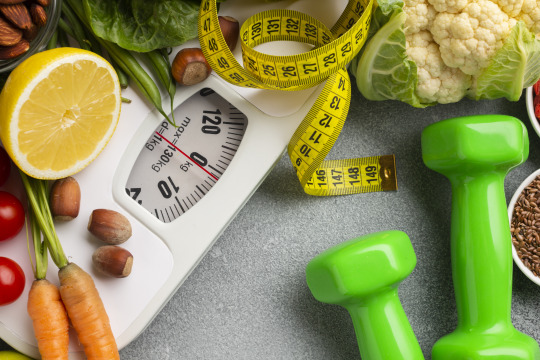
The right diet for losing fat varies from person to person based on individual factors such as age, gender, weight, activity level, and any underlying health conditions. However, there are some general principles that can help:
Caloric Deficit: The most important factor in losing fat is to consume fewer calories than you expend. This creates a caloric deficit, prompting your body to burn stored fat for energy. You can achieve this by reducing your calorie intake, increasing your physical activity, or a combination of both.
Balanced Macronutrients: Your diet should include a balance of carbohydrates, proteins, and fats. Focus on whole, nutrient-dense foods such as fruits, vegetables, lean proteins, whole grains, and healthy fats.
Protein Intake: Protein is crucial for preserving muscle mass while losing fat and can help you feel full and satisfied. Aim to include a source of protein in each meal, such as lean meats, poultry, fish, eggs, dairy products, legumes, tofu, or tempeh.
Healthy Fats: Include sources of healthy fats in your diet, such as avocados, nuts, seeds, olive oil, and fatty fish like salmon. These fats can help keep you full and support overall health.
Complex Carbohydrates: Choose complex carbohydrates over simple ones. Whole grains like quinoa, brown rice, oats, and whole wheat products provide fiber, which can aid in digestion and help you feel fuller for longer periods.
Portion Control: Be mindful of portion sizes to avoid overeating. Use smaller plates, measure your servings, and pay attention to hunger and fullness cues.
Limit Processed Foods and Added Sugars: Minimize your intake of processed foods, sugary snacks, and beverages as they tend to be high in calories and low in nutrients. Opt for whole, unprocessed foods whenever possible.
Stay Hydrated: Drink plenty of water throughout the day. Sometimes, thirst can be mistaken for hunger, leading to unnecessary calorie consumption.
Meal Timing: Some people find success with intermittent fasting or eating within a specific window of time each day. Experiment with different meal timing strategies to see what works best for you.
Consistency and Patience: Losing fat takes time and consistency. Focus on making sustainable changes to your diet and lifestyle rather than seeking quick fixes.
Mindful Eating: Pay attention to your body's hunger and fullness cues. Eat slowly and mindfully, savoring each bite, and stop eating when you feel satisfied, rather than full.
Include Fiber-Rich Foods: Fiber-rich foods such as fruits, vegetables, whole grains, and legumes can help regulate digestion, keep you feeling full, and support overall health.
Limit Liquid Calories: Be cautious of high-calorie beverages such as sugary sodas, fruit juices, and alcoholic beverages, as they can contribute to weight gain without providing satiety. Opt for water, herbal tea, or other low-calorie options instead.
Be Flexible: Allow for flexibility in your diet to accommodate social occasions or cravings. It's okay to enjoy treats in moderation, as long as they fit within your overall calorie and macronutrient goals.
Track Your Progress: Keep track of your food intake and progress toward your goals using a food diary, mobile app, or other tracking tools. This can help you stay accountable and make adjustments as needed.
Prioritize Sleep: Aim for 7-9 hours of quality sleep per night. Inadequate sleep can disrupt hunger hormones and metabolism, making it harder to lose fat.
Manage Stress: Chronic stress can lead to overeating and weight gain. Practice stress-reducing techniques such as mindfulness, meditation, yoga, or spending time outdoors to support your fat loss efforts.
Include Strength Training: Incorporate strength training exercises into your fitness routine to build and maintain muscle mass. Muscle tissue burns more calories at rest than fat tissue, so increasing your muscle mass can help boost your metabolism.
Stay Consistent: Consistency is key when it comes to fat loss. Stick to your healthy eating plan and exercise routine even on days when you don't feel motivated. Small, sustainable changes over time can lead to significant results.
Seek Support: Surround yourself with supportive friends, family members, or online communities who can encourage and motivate you on your fat loss journey
Having a support system can make it easier to stay on track and overcome challenges.
By incorporating these additional points into your fat-loss diet, you can optimize your efforts and increase your chances of success. Remember that what works best for one person may not work for another, so it's essential to find an approach that fits your individual preferences, lifestyle, and goals.
Before making any significant changes to your diet, it's a good idea to consult with a healthcare professional or a registered dietitian, especially if you have any underlying health conditions or dietary restrictions. They can provide personalized guidance tailored to your individual needs and goals.
#fatloss#healthy#health#lose weight#weight loss#weightloss#diet to lose weight#fat loss#losing weight#fatlosstips#weightloss goals#weight loss success stori#weight loss motivation#weight loss tips#diet#dieting#weight management#weight loss diet#healthy living#healthcare#health and wellness#healthblr#health & fitness#healthy eating#healthy diet#healthy recipes#healthyfood#health tips#fitness and exercise#fitness
24 notes
·
View notes
Text
A Naruto Headcanon - The Culinary History of the Ninja World.
i'm back and not so bare with me. this headcanons is related to a story telling how chouji and karui's marriage went down. ill post it eventually.
EACH COUNTRY’S CULINARY HISTORY
Konohagakure (Country of Fire)
Konohagakure aka the land of the free. Many things make up the uniqueness of the cuisine of the country of fire. First, they are the king of importation, so their diet is really diverse and touched all sectors evenly. They grow all kind of vegetables to meet the need of its residents. While there are not has much native plants from the area in their current diet contrary to other villages like Suna and Kiri.
Konoha being built on a vast forest, their main fruit consumption comes from small fruit trees and fruit trees like apples, pears, and pomegranate. Anything that grows on a tree is often easily available since it takes its roots in Konoha’s founder Hashirama Senju.
The country are the main producer and consumer of eggs and meat especially pork (which they export all over the ninja world) this where you get the whole BBQ concept and omelets. Another downfall of the cuisine from Konoha is the heavy presence of processed goods in everyday cooking preparation. The current culture is far more removed from its traditional cooking methods. Referred to as the Senju Diet is almost getting lost and seen has a flower from the past. Many (often older individuals) resist the hard change that came trough time and tries to uphold the consumption of the way ninjas ate in the past.
Lotus Root is a staple of the Senju Diet

Even Naruto can testify to this and noticed how it hard for him maintain the same diet as when he was a child (aside eating ramen), the way fast foods chains have almost came out of nowhere and took over the market deeply concerns him (especially how its taking hold of this younger generation). The deliberate effort towards modernization and proving the country is the first in everything, can reach everything, can eat everything, can win against anyone basically walking like they are the goat of the ninja world has affected negatively old traditions in subtle ways and in other more obvious ways. Like how the Konoha can keep escape the threat of famine by stealing other nations resources.
At the same time, the combination of different culinary practice gave birth to various more dishes with various diverse ingredients and interesting like Takoyaki, okonomiyaki & dango
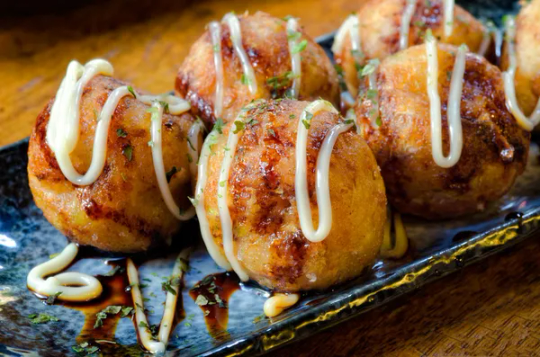
Like mentioned before, industrialization gave birth to many processed who are a staple in those dishes. products who are often only found in the country of fire like fish cakes & narutomaki. The land of fire is the soup & noodles master, it’s like their national food for being convenient and versatile with they make the infamous ramen but other dishes like stir-frys Yes, it a generous filling cuisine to overflow your stomach
Classic/Staple Konoha Meal=Shoyu Miso/Pork Ramen with Narutomaki, Apple Salad, Dango, Sushi, Takoyaki, pickled radish, Beef BBQ
Sunagakure (Country of Wind)
The cuisine from Suna is unique. Not only emerging from a desertic land, but it was also able to survive the test of time and stay true to its original roots. Based on the high temperatures and sandy soil of the land of wind, the residents have access to interesting crops who cannot be found elsewhere in the ninja world. Suna is the homeland of dates, they are the main intake of sugar in its diet. They are used in countless recipes like sweet & pastries. they are used to sweetened teas since tea drinking is a big thing. Offering tea is a tradition when receiving guests and tea was used by nomads who made long trip in the desert in order to stay hydrated.

In Sunagakure, they go hard on sweets. Especially dates since the are the only producer of them. They have countless of pastries, candies and date-bases recipes because it was once use as a method of survival in the long windy season in the desert or to have the sugar necessary to be transformed in a energy source to endure long trip in the desert. They are a national pride since most nuts in the ninja world grows in the country of wind; almonds, pistachios, walnuts, etc. they also showcase delicate and unique culinary practices when it comes to pastries who set Suna apart from other nations. It is the only place to find citrus, olive & argan trees used to make oils mostly made for exportation & their lucrative citrus production industry.

Their eating style is different since it is not uncommon to eat with your hands. For a long time, families were large so the habit of having a large plate to share with many emerge from that condition

Due to frequent drought, the country of wind has specialized themselves in the production of survival crops like grains like millet, sorghum & wheat who are also a staple in the cuisine of Suna. they most of the time milled to make flour to produce various types of bread crepe and flat breads (also see as more convenient since they don’t require yeast to be cooked). Alongside that, the consumption of legumes like lentils and different kinds of beans is the main source of protein and prized as all around superfood. They are cooked in paste and stew often eaten with bread.
Staple/Classic Suna Meal=Large plate of various pastes/creamy sauces made of beans & lentils, grilled eggplant, hummus, flat bread, millet crepe, spinach, citrus tea,
Kirigakure (Country of Water)
The main meal is Kiri is grilled fish.
Unfortunately, Kirigakure has the reputation of eating ANYTHING that swims, crawls, run or fly in the ocean. First and firmly base on their location and how the practice of fishing is part of so many residents lives.

Also, it comes from the lack of access to goods from importation of other nations. For very long time, Kiri and the surrounded regions were left on their own when a bad harvest happened, or if the climate hindered the quantity of fish collected. In those cases, the villager learned to make anything of every single thing they found (in the ocean). Due to their different economical system (mostly based on exchange of goods), it took a long time for Kiri to join the market of importation and exportation. Now they are the main exporter of seafood of various types and fish (a staple in their diet). The land of fire became the main consumers of seafood above the country of water itself. The never-ending high demand for sea product (including fish) has opened the door for illegal activity to create non-approved fish farms and illegal fishing. The country of wind is guilty, while having no access to water yet desiring sea products (which is recent because they try to follow after the country of fire and the whole globalization narrative).The Country of Fire being the biggest culprit due to their insatiable desire to reach all and taste all (even without permission).

Their known cultural theft has implication in the problem since a traditional dish named サメの目 (Same no Me written Samenome meaning Shark Eyes) which consist of thin layers of fish rolled and stuffed with black wild rice and bitter herbs (it is name like this since it resemble the pupils of sharks) was ‘’discovered’’ by ninja scientist from Konohagakure during early invasion of the country of water by various bigger nations for natural resources in this case being clay who was abundant along any body of water (used to make pots and tolls before the emergence of various metals) also to take control and harvest the almost infinite amount of fresh water. The devastation of natural habitat and the disruption of the ecosystem cause a destruction that couldn’t be healed instead it changed the nature of the environment. Since then, most bodies of water in the land of water turned into seawater, the once flourishing pastures of green leafy galore died and the remaining surviving plants gave birth to what we know today as bitter herbs (ex: dandelion, wormwood, chamomille, peppermint, etc) and they are a staeple in the cuisine of Kiri, for some their main intake of green plants. They are also valued for their medicinal values (you know them plants Haku was collecting in the woods)
Learn more about bitter herbs here: https://dirthappy.com/bitter-herbs/
(Going back to what we were talking about)The discovery of Samenome was then taken back to the country of fire and after being merged and modified with the local crops and different culinary practices became what we know today as sushi; the captain of Konoha’s cuisine along side with Ramen. The seaweed paper also originally comes from Kiri, they were not used as food but fertilizers for growing crops. The practice of harvesting seaweed became popular in the southern part of the country of fire after the nori seaweed was discovered in its waters. Meanwhile they still import wakame from the country of water since it’s a staple for various soups and side dishes.
In The Country of Water, they consumed more the wild varieties of different crops like wild black rice, quinoa & amaranth as a main source of carbs.
In Kiri, they seasoned everything with pepper, everything; rice, bitter herbs, fish & seafood, grains. Some regions of the country of water house the spiciest pepper you can find in the warm months of the summer and the most frost resistant cabbages during the cold months. Now, they import a lot of pepper product from The country of lightning during the most of the year. Most of the seasoning is onion-based but the access to salt from the waters allowed the spectrum of seasoning to widen but also utilize is in order to ferment or pickle foods for the winter making pickled goods a staple in the cuisine of Kiri even for pickled fish.
Staple/Classic Kiri meal= Grilled fish, Samenome, spicy pickled cabbage, amaranth crepe of fritters, bitter herbs, pepper sauce
Kumogakure (Country of Lightning)
The cuisine of Kumogakure is different than typical meals you would find in other nations. Like Suna the uniqueness reveals itself in their cuisine since its most popular dishes are made of ingredients that can only be found in the country of lightning. Cuisine of Kumogakure follows various principals making their reputation.
Beef is a luxury food. Due to its location, residents of the country of lightning were consuming other animals like sheep and goat who are abundant in rocky areas. The first wild buffalos were in fact imported from neighbor countries and are domesticated for food in small quantities because most green pasture (outside of main cities) are already occupied by sheeps. Many attempts were made to grow the bovine population but failed due to competition for food and access to grass.
Meat is more regarded as side dishes since their protein source mostly come from green vegetable and beans. Like in Suna, where legumes are praised for their high nutritional value but in the country of wind they eat lentils & chickpeas, meanwhile in Kumo they are eating kidney beans, black eyes peas and their infamous black beans. Each nation has a particular legume/bean/pulse they cherish in their cuisine. The Country of fire is house to all types of sprouts like of mung bean and edamame/soy beans. Interestingly, the practice of making tofu comes from Amegakure and has spread to neighboring nations. In Kiri, they eat beans in their original form, simple steamed and sometimes raw so they prefer yardlong beans and peas of different kinds.
· The land of lightning is famous for their abundance of herbs & spice. Hence why they weren’t as enthusiast to rush into meat consumption since they can make many vegetables taste amazing by seasoning it right. Plants like ginger, turmeric, various varieties of peppers, allspice, paprika, star anise & parsley are native to the area. the exception is garlic since it can be found abundantly across the ninja world.
· The cuisine of Kumo could be defined as quick and simple. Hence why they are numerous meals in bites sizes like fried dough (a popular street food), samoussa, meat/bean patties, dried sweet potatoes chips (chouji’s favorite). Unfortunately, frying/pan-frying is a prominent method of cooking so to balance the diet the preparation of vegetables filled stews and soups comes in the picture and they don’t eat foods like white rice. First, because it does not grow in the region at all, instead it’s the rare place where eating brown rice is thing and meals like fermented pureed yam are often use as a substitute for rice along many sauces and stews (after white rice became popular across the ninja world.). In Suna, they sticked to basmati rice and Kiri to black rice but white rice & sweet rice (hybridized in the country of fire) has always been one of the first food to be distributed is smaller nations in food crisis and for daily consumption because of how easily it is to massively produce and for their poorer nutritional value.

(ex: meat/beans patties, sweet potatoes chips, deep fried dough (bottom pic above) called ふわふわ/Fuwa Fuwa meaning Fluffy since the yeast used to make them creates a treat light and airy/fluffy like clouds & samoussa)
· SAUCE, SAUCE, SAUCE. Again, we said people from the Cloud love when it’s simple (hence why many dishes from Konoha like Takoyaki seems like an equation of calculus to them but those who could taste it enjoyed it actually). Its ‘’we dump all in the pot and let it cook’’ cooking style. If your meal doesn’t have a sauce of any kind, its not from Kumo. Many of them contained some form of peanut butter (a national pride food). The country of lightning is the biggest producer of peanuts and use it in various dishes
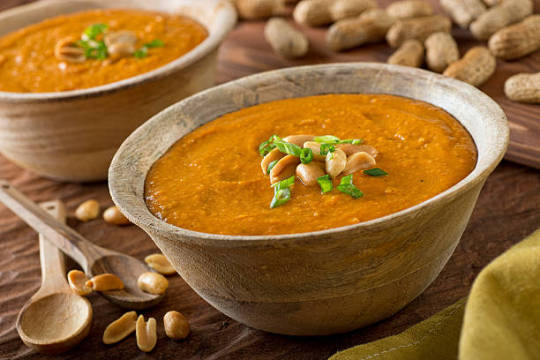
(exemples: peanut soup, fermented cassava pulp, cassava leave sauce, callaloo/amaranth soup, spinach peanut butter sauce )
· Did you know that Kumo’s peanut brittle’s distant cousin is the Nougat from Suna? It’s the Raikage’s favorite snack. Like the menu of the wedding feature the country most prized, popular, and fancy meals, most of them are the raikage’s favorites.

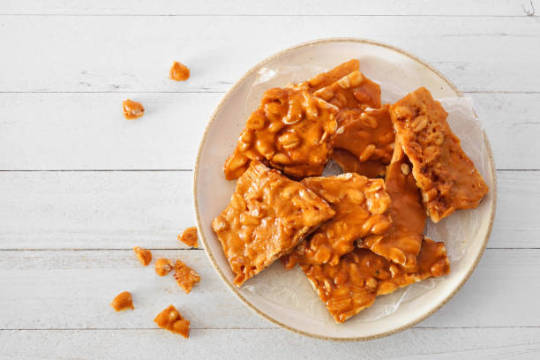
(from left to right, Nougat (from Suna) & Peanut Brittle also called 稲妻バー/Inazuma bars meaning Lightning Bars) because when you prepare them it is tradition to punch the plate in the middle to break it into smaller portions, it looks like the food got hit by lightning.
Many exotic tropical grows outside of big cities like mangos, pineapples & papayas making fruit the main sugar intake in the Kumo diet.
#naruto modern au#naruto#boruto#naruto headcanons#naruto imagines#boruto naruto next generations#boruto headcanons#boruto imagines#headcanons#naruto shippuden#naruto au#naruto uzumaki#haku yuki#zabuza momochi#choji akimichi#karui akimichi#chocho akimichi#konoha#konohagakure#sunagakure#KIRIGAKURE#kirigakure#kumo#kumogakure#killer bee#anime food#food#sasuke uchiha#headcanon#imagines
135 notes
·
View notes
Text
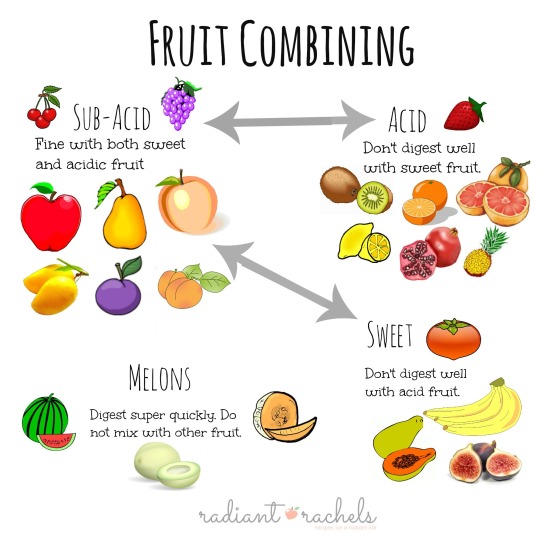
I like to re post this every now and again because it's good advice I frequently forget.
Also I post it in part because I'm laying in bed with Covid (for the first time) at the moment and eating as much fruit as I can to expedite recovery. I grabbed a banana and orange, ate the banana and asked myself if this was a good combo or not. Glad I checked, because it was not. The last thing I need is indigestion.
But because it's me, my main focus has been doubling down on nutrition and observing my own results. I was eating plant based before, but sometimes I went a little too hard on the peanut butter trail mix, breads, or other sweet treats.
My doctor said rest and hydrate, but I took it a step further and since testing positive have cut out wheat, sugar, and any kind of dairy or processed foods. I figure nothing that could make inflammation worse. I've been consuming tons of herbs like cinnamon, ginger, echinacea, and turmeric while eating fresh citrus fruits like lemon, orange, strawberry, and pineapple daily.
Now I did a bit of tooling about the internet to see if any studies had been done over the last four years regarding a plant based diet and it's effects on Covid. The results were hopeful.
I found one study that said,
"Merino et al revealed that healthy plant-based foods could decrease the risk and severity of COVID-19.21 In this large survey, it was shown that as the quality of the diet rises, the risk of disease COVID-19 (HR 0.91) and severe COVID-19 (HR 0.59) diminishes.
Which gave me hope so I kept digging.
Another one stated, "Compared with an omnivorous Western diet, plant-based diets containing mostly fruits, vegetables, grains, legumes, nuts and seeds, with restricted amounts of foods of animal origin, are associated with reduced risk and severity of COVID-19. "
And I can tell you that has been my experience thus far. I developed a fever that went away after 24 hours and didn't go over 100.4. My only other symptom has been a stuffy nose with sinus pressure. Im definitely tired and need to limit activity but I can still taste and smell, breathe through my nose a decent amount of the time, and I'm not coughing. I'm lucky in that I have time off from work and for that I am grateful, as rest is another key component.
And why would a plant based diet be so beneficial for mitigating Covid symptoms? Because, "plant-based dietary patterns are rich in antioxidants, phytosterols and polyphenols which positively affect several cell types implicated in immune function and exhibit direct antiviral properties."
The full study can be found if you pop this into Google::
Acosta-Navarro JC, Dias, LF, de Gouveia LAG et al. Vegetarian and plant based diets associated with lower incidence of COVID-19. BMJ Nutr Prev Health 2024:e000629. doi:10.1136/bmjnph-2023-000629
I was really scared at first and this information helped me feel more empowered in my health and recovery. It's not a substitute for any medical attention or prevention like vaccines, hand washing, and mask wearing- all things I was doing regularly prior to getting sick which may have also been variables in keeping my symptoms down. A little help goes a long way.
Has any other plant based person had a similar experience? Let me know.
#food#vegan#foodie#healthy#health#vegetarian#fitness#diet#nutrition#plant based#plant based diet covid#covid conscious#covid recovery#covid vegan#study#herbology#herbs#inflammation#fitblr#healthy lifestyle#long covid
39 notes
·
View notes
Text
Best Practices in Vegan Diets
Adopting a vegan diet can be highly beneficial for health, but it's essential to follow best practices to ensure nutritional adequacy. Here are some key guidelines:
🥗1. Balanced Nutrient Intake
Protein: Include legumes, tofu, tempeh, nuts, seeds, and quinoa.
Iron: Consume lentils, chickpeas, spinach, and fortified cereals. Pair with vitamin C-rich foods for better absorption.
Calcium: Opt for fortified plant milks, tofu, tahini, and leafy greens.
Vitamin B12: Obtain from fortified foods or supplements.
Omega-3s: Eat flaxseeds, chia seeds, and walnuts. Consider algal oil supplements.
Vitamin D: Get from fortified foods, sunlight, or supplements.
Zinc: Include beans, lentils, nuts, seeds, and whole grains.
🍱2. Diverse Food Choices
Incorporate a wide variety of fruits, vegetables, whole grains, legumes, nuts, and seeds to cover a broad spectrum of nutrients.
🌽3. Adequate Caloric Intake
Ensure you’re consuming enough calories, focusing on nutrient-dense foods like avocados, nuts, seeds, and whole grains.
🧆4. Minimize Processed Foods
Limit highly processed vegan alternatives and prioritize whole, minimally processed foods for optimal health.
💦5. Hydration
Drink plenty of water, as plant-based diets high in fiber increase water needs.
🥘6. Home Cooking
Prepare meals at home to control ingredients and nutritional content. Experiment with different recipes to keep meals interesting.
🏷️7. Label Reading
Check food labels for added sugars, unhealthy fats, and sodium, and verify fortification with essential nutrients.
🏥8. Regular Health Check-ups
Monitor nutritional status with regular check-ups and blood tests, adjusting diet or taking supplements as needed.
💊9. Supplements
Consider supplements for hard-to-obtain nutrients like vitamin B12, vitamin D, and omega-3s.
📱10. Community Support
Join vegan groups or online communities for support, recipe ideas, and tips.
📝Conclusion
A well-planned vegan diet can be nutritious and enjoyable. By following these best practices, vegans can meet their nutritional needs and enjoy a diverse and healthy diet.
📱For more info and details visit- Free Skills Hub
https://www.freeskillshub.com/best-practices-in-vegan-diets/

#plantbased#crueltyfree#healthy#lifestyle#veganfood#veganeats#veganrecipes#sustainable#nutrition#plantpower#dairyfree#meatfree#ecofriendly
13 notes
·
View notes
Text

Benefits of Juicing:
The average American has a lot of built-up toxins and waste in the body. This is because we are exposed to environmental pollution and consume products that have lots of preservatives and chemicals, which the body cannot properly process. Drinking freshly made juices helps your body efficiently absorb nutrients from the fruits and vegetables. When you consume raw fruits in vegetables, your body doesn’t have to work as hard to utilize them, meaning your bodily systems and organs can function optimally.
Results You Can Experience While Juicing:
Weight Loss
Hydration
An Alkaline Body
Clearer Skin
Healthier Nails
More Energy
Mental Clarity
Improved Immune System
Side Effects of Juicing:
While juicing is beneficial, it is best if it is done in moderation. Juicing for too long can throw off your body because it starts to store food differently, when you start eating real food again. It may be harder for you to lose weight after juicing for a long period of time. It may also affect your digestive system, due to the fact that your body doesn’t really have work to digest food. This is why it is best to juice for three days to one week at a time. This is also why a lot of people like to do all smoothie diets. Smoothies help you feel full and they are packed with dietary fiber.
7 notes
·
View notes
Text
The Role of Nutrition in Mental Health
Nutrition plays a crucial role in maintaining not only physical health but also mental well-being. What we eat can significantly impact our mood, energy levels, and overall mental health. Understanding the connection between diet and mental health can help you make informed choices that support a healthier mind. Here’s a look at how nutrition affects mental health and some tips for optimizing your diet for better mental well-being.
The Gut-Brain Connection
Gut Health and Mood: The gut-brain axis is a complex communication network that links the gut and the brain. A healthy gut can positively influence your mood and mental health. An imbalance in gut bacteria can lead to inflammation and may contribute to anxiety and depression.
Probiotics and Prebiotics: Incorporating foods rich in probiotics (like yogurt, kefir, and sauerkraut) and prebiotics (like garlic, onions, and bananas) can support a healthy gut microbiome.
Essential Nutrients for Mental Health
Omega-3 Fatty Acids: Found in fatty fish, flaxseeds, and walnuts, omega-3 fatty acids are essential for brain health. They have been shown to reduce symptoms of depression and anxiety.
B Vitamins: B vitamins, particularly B6, B12, and folate, play a vital role in brain function. Deficiencies in these vitamins can lead to mood disorders. Include foods like leafy greens, beans, eggs, and fortified cereals in your diet.
Vitamin D: Known as the “sunshine vitamin,” vitamin D is linked to mood regulation and cognitive function. Sunlight exposure and foods like fatty fish, egg yolks, and fortified dairy products can help maintain adequate levels.
Magnesium: This mineral helps regulate neurotransmitters that affect mood. Foods rich in magnesium include nuts, seeds, whole grains, and dark chocolate.
Antioxidants: Antioxidants, such as vitamins C and E, combat oxidative stress in the brain. Berries, citrus fruits, nuts, and seeds are excellent sources of antioxidants.
The Impact of Diet on Mental Health
Balanced Diet: A balanced diet that includes a variety of fruits, vegetables, whole grains, lean proteins, and healthy fats supports overall mental health. Nutrient-dense foods provide the necessary vitamins and minerals for optimal brain function.
Hydration: Staying hydrated is crucial for cognitive function and mood regulation. Aim to drink plenty of water throughout the day and limit sugary or caffeinated beverages.
Avoid Processed Foods: Diets high in processed foods, refined sugars, and unhealthy fats can negatively impact mental health. These foods can lead to inflammation and nutrient deficiencies, contributing to mood swings and mental fatigue.
Specific Diets and Mental Health
Mediterranean Diet: This diet emphasizes fruits, vegetables, whole grains, lean proteins, and healthy fats like olive oil. Studies have shown that the Mediterranean diet can reduce the risk of depression and improve overall mental health.
Plant-Based Diets: Diets rich in plant-based foods provide antioxidants, fiber, and essential nutrients that support brain health. Including a variety of colorful fruits and vegetables can enhance mood and cognitive function.
Practical Tips for a Mental Health-Boosting Diet
Plan Balanced Meals: Ensure each meal includes a mix of protein, healthy fats, and complex carbohydrates to maintain steady energy levels and support brain health.
Snack Smart: Choose nutrient-dense snacks like nuts, seeds, fruit, and yogurt to keep your energy up and your mood stable throughout the day.
Mindful Eating: Practice mindful eating by paying attention to your hunger and fullness cues. Avoid distractions while eating to better enjoy your food and listen to your body’s needs.
Limit Alcohol and Caffeine: Both alcohol and caffeine can affect your mood and sleep patterns. Consume them in moderation and be mindful of their impact on your mental health.
Conclusion
Nutrition plays a vital role in maintaining mental health. By focusing on a balanced diet rich in essential nutrients, you can support your brain function and emotional well-being. What dietary changes have you made to support your mental health? Share your tips and experiences in the comments!
5 notes
·
View notes
Text

Healthy bodies for healthy living: 10 tips to stay healthy and fit.
1. Ensure Adequate Sleep
Maintaining a healthy body requires sufficient sleep. Inadequate sleep negatively impacts metabolism, mood, concentration, motor skills, stress hormones, cardiovascular health, and the immune system. Aim for 6-8 hours of sleep to support the body's healing, repair, and overall well-being.
2. Adopt a Well-Balanced Diet
Staying fit and healthy is closely tied to consuming a well-balanced diet. This involves incorporating a variety of foods in appropriate quantities, tailored to individual needs, and guided by medical advice. Prioritize easily digestible foods with the right proportions of proteins, vitamins, and minerals, steering clear of junk food and opting for fresh fruits, vegetables, nuts, and seeds.
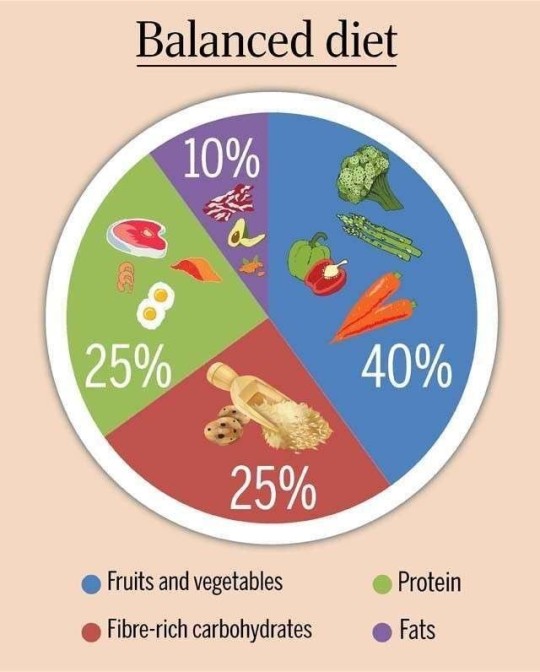
3. Engage in Daily Exercise
Regular exercise is crucial for maintaining fitness. Whether it's a half-hour walk or a full-hour workout, exercise aids in weight management, improves blood circulation, and enhances muscle fitness. Combining daily exercise with a balanced diet is particularly beneficial for addressing issues like fatigue, stress, and depression.

4. Hydrate with Water
Staying healthy is simplified by staying hydrated. Aim for at least 16 glasses of water daily to support digestion, maintain energy levels, and naturally eliminate toxins through the skin and urine. Let water serve as the natural cleanser for your organs.
5. Purify Your Body
Detoxify your body by embracing a diet rich in fruits and juices, avoiding spices. This cleansing process purifies the bloodstream, eliminates toxins, and promotes a healthier, lighter, and rejuvenated body.
6. Never Skip Meals
To stay fit and healthy, especially in terms of maintaining a healthy weight, avoid skipping meals, particularly breakfast. Regular meals ensure sustained energy levels, preventing overeating later in the day.
7. Say No to Smoking and Drinking
Maintain fitness and health by steering clear of addictive habits like smoking and drinking. Cigarettes contain harmful compounds leading to serious health issues, while excessive alcohol consumption can result in high blood pressure, liver conditions, and memory impairment.

8. Embrace Yoga and Meditation
Achieve fitness at home through the practice of yoga and meditation. Research indicates that these practices simplify thought processes, foster internal healing, and bring about positive hormonal and bodily changes, aiding in stress and depression management.

9. Integrate Probiotics
Prioritize gut health for overall fitness, as a healthy gut supports immunity, heart health, and mental well-being. Research suggests that taking probiotics, beneficial bacteria offering health benefits, contributes to maintaining a balanced digestive system.
Written by Ewurabena.
17 notes
·
View notes
Text
5 Best health tips for the pregnant women

Take Prenatal Vitamins: Prenatal vitamins are crucial as they contain essential nutrients like folic acid, iron, and calcium, which support the baby’s development and help prevent birth defects1.

Eat a Balanced Diet: Focus on consuming a variety of fruits, vegetables, whole grains, and lean proteins. Avoid processed foods, excessive caffeine, and raw or undercooked seafood12.

Stay Hydrated: Drinking plenty of water is important to support increased blood volume and amniotic fluid levels. Aim for at least 8-10 glasses of water a day1.
Get Plenty of Rest: Adequate sleep is essential for both physical and emotional well-being. Aim for 7-9 hours of sleep each night and take naps if needed1.
Exercise Regularly: Moderate exercise, such as walking, swimming, or prenatal yoga, can help reduce stress, improve circulation, and boost mood. Always consult with your healthcare provider before starting any new exercise routine13.
Taking care of yourself during pregnancy is vital for both you and your baby. Do you have any specific concerns or questions about pregnancy health?
3 notes
·
View notes
Text

Foods To Boost Insulin Sensitivity
Insulin sensitivity is your body's ability to effectively use insulin to regulate blood sugar levels. Improving it can help prevent conditions like type 2 diabetes and metabolic syndrome.
Here are some food groups that can help enhance insulin sensitivity:
Focus on These Food Groups
* Non-starchy vegetables: These are low in carbohydrates and rich in fiber, which can help regulate blood sugar levels. Examples include broccoli, spinach, kale, carrots, and bell peppers.
* Lean proteins: These help maintain blood sugar levels and support overall health. Good options include chicken, fish, tofu, beans, and lentils.
* Whole grains: These provide sustained energy and fiber, contributing to better blood sugar control. Opt for brown rice, quinoa, whole-wheat bread, and oats.
* Healthy fats: These are essential for overall health and can help regulate insulin levels. Include avocados, olive oil, nuts, and seeds in your diet.
* Low-fat dairy: Dairy products can be part of a balanced diet, providing calcium and protein. Choose low-fat or skim milk, yogurt, and cheese.
* Fruits: While fruits contain natural sugars, they also offer fiber and essential nutrients. Enjoy them in moderation as part of a balanced diet.
Additional Tips
* Limit processed foods: These often contain high amounts of added sugars and unhealthy fats, which can negatively impact insulin sensitivity.
* Control portion sizes: Even healthy foods can contribute to weight gain if consumed in excess.
* Stay hydrated: Drinking plenty of water helps regulate blood sugar levels.
* Regular exercise: Physical activity improves insulin sensitivity and overall health.
#comfort food#fast food#food fight#healthy food#food photography#food for thought#foodie#food#foodpics#foodmyheart#foodlover#tw food#lunch recipes#pasta recipes#pasta recipe#salad recipes#soup recipe#recipe#reciprocidade#reciprocity#recipies#recipes#cozy autumn#cozy fall#cozy cozy#healhtylifestyle#healthy salad recipes#healthy lunch ideas#healthy lunch#healthy diet
9 notes
·
View notes
Text
Stay Fit, Stay Healthy: The Power of a Balanced Diet
The Importance of Maintaining a Healthy Diet to Avoid Illness and Overweight

In today's fast-paced world, it's easy to fall into unhealthy eating habits that can lead to weight gain and various health issues. However, being overweight not only affects one's appearance but also increases the risk of several diseases. Therefore, it is crucial to pay attention to your diet and make healthier choices.
Why a Healthy Diet Matters
Prevents Weight Gain: A balanced diet rich in nutrients and low in unhealthy fats and sugars helps maintain a healthy weight. Overeating and consuming junk food can lead to obesity, which is a major risk factor for many chronic diseases.
Boosts Immunity: Proper nutrition strengthens the immune system. Foods rich in vitamins, minerals, and antioxidants enhance the body's ability to fight off infections and illnesses.
Enhances Energy Levels: Eating a balanced diet ensures that your body gets the necessary nutrients to produce energy. This keeps you active and reduces fatigue.
Promotes Mental Health: A nutritious diet can improve brain function and mood. Certain foods, like those rich in omega-3 fatty acids, are known to support mental health and reduce the risk of depression.
Tips for Maintaining a Healthy Diet
Eat a Variety of Foods: Include a wide range of fruits, vegetables, whole grains, and lean proteins in your diet. This ensures you get all the essential nutrients your body needs.
Control Portion Sizes: Overeating, even healthy foods, can lead to weight gain. Be mindful of portion sizes and avoid eating until you feel overly full.
Limit Processed Foods: Processed and fast foods are often high in unhealthy fats, sugars, and sodium. Opt for fresh, whole foods whenever possible.
Stay Hydrated: Drinking enough water is essential for overall health. It helps maintain bodily functions and can aid in weight loss by keeping you full and reducing calorie intake.
Plan Your Meals: Planning meals ahead of time can help you make healthier choices and avoid the temptation of unhealthy snacks and fast food.
Conclusion
Taking care of your diet is not just about losing weight; it's about maintaining overall health and preventing illnesses. By making conscious food choices and adopting healthy eating habits, you can improve your quality of life and ensure long-term well-being. Remember, a healthy outside starts from the inside, so nourish your body with the right foods and stay active!
3 notes
·
View notes
Text
What are some tips for specifically losing belly fat?

Losing belly fat specifically can be challenging, but with the right approach, it's achievable. Here's an extensive guide on how to effectively target and reduce belly fat. This guide will cover dietary strategies, exercise routines, lifestyle changes, and mental health considerations that can help you achieve your goals.
1. Understanding Belly Fat: Types and Causes
Belly fat, also known as abdominal fat, is not just a nuisance that makes your clothes feel tight; it’s harmful to your health. There are two types of belly fat:
Subcutaneous Fat: This is the pinchable fat that lies just under the skin.
Visceral Fat: This fat surrounds your organs and is associated with various health problems like heart disease, type 2 diabetes, and certain cancers.
The causes of belly fat are multifaceted and can include poor diet, lack of exercise, stress, genetics, and hormonal imbalances. Understanding these causes can help tailor your approach to losing belly fat.
2. Dietary Strategies
a. Reduce Caloric Intake
To lose belly fat, you need to create a calorie deficit, which means consuming fewer calories than your body needs. This forces your body to burn stored fat for energy, including belly fat.
Track Your Calories: Use apps or food diaries to track your daily caloric intake.
Portion Control: Be mindful of portion sizes to avoid overeating.
Choose Nutrient-Dense Foods: Opt for foods rich in vitamins, minerals, and fiber but low in calories.
b. Focus on a Balanced Diet
A balanced diet is crucial for fat loss and overall health.
Increase Protein Intake: Protein can boost metabolism, reduce appetite, and aid in fat loss. Include lean meats, fish, eggs, legumes, and nuts in your diet.
Eat Healthy Fats: Incorporate sources of healthy fats like avocados, olive oil, and nuts. These fats can help reduce inflammation and support weight loss.
Prioritize Fiber: Fiber-rich foods like vegetables, fruits, and whole grains help you feel full longer, reducing overall calorie intake.
Limit Sugars and Refined Carbs: These foods can lead to fat storage, especially around the belly. Reduce consumption of sugary drinks, sweets, and refined grains.
c. Hydration
Staying hydrated is essential for metabolism and can help reduce belly fat.
Drink Plenty of Water: Aim for at least 8 glasses a day.
Limit Alcohol: Alcohol is high in empty calories and can lead to weight gain, especially around the midsection.
3. Exercise Regimen
a. Cardiovascular Exercises
Cardio exercises are effective for burning calories and reducing overall body fat, including belly fat.
High-Intensity Interval Training (HIIT): This involves short bursts of intense exercise followed by rest or low-intensity exercise. HIIT is known for its efficiency in burning fat.
Steady-State Cardio: Activities like running, swimming, or cycling at a steady pace can also help burn calories and reduce fat.
b. Strength Training
Building muscle through strength training can help increase your metabolism and burn more calories, even at rest.
Compound Movements: Exercises like squats, deadlifts, and bench presses target multiple muscle groups and are effective for fat loss.
Core Strengthening: Exercises like planks, Russian twists, and leg raises specifically target the abdominal muscles, helping to tone the area.
c. Flexibility and Stability Exercises
Incorporating flexibility and stability exercises can improve overall body function and reduce the risk of injury, aiding in a more effective workout routine.
Yoga: Yoga can help reduce stress (a contributor to belly fat) and improve flexibility.
Pilates: This focuses on core strength, stability, and flexibility, which can help tone the abdominal area.
4. Lifestyle Changes
a. Sleep
Getting enough sleep is crucial for fat loss. Lack of sleep can lead to weight gain, especially around the belly.
Aim for 7-9 Hours of Sleep: Quality sleep helps regulate hormones that control hunger and stress, aiding in weight management.
Establish a Sleep Routine: Go to bed and wake up at the same time each day to regulate your body’s internal clock.
b. Stress Management
Stress can lead to weight gain by increasing cortisol levels, which promote fat storage in the belly.
Practice Relaxation Techniques: Activities like meditation, deep breathing, and mindfulness can help reduce stress.
Engage in Hobbies: Spend time doing things you enjoy to help lower stress levels.
c. Limit Sedentary Behavior
Reducing sedentary time is crucial for losing belly fat.
Move More Throughout the Day: Stand up, stretch, or take short walks regularly, especially if you have a desk job.
Incorporate Physical Activity: Aim for at least 150 minutes of moderate-intensity aerobic activity or 75 minutes of vigorous-intensity activity each week, along with muscle-strengthening activities.
5. Hormonal Balance
Hormonal imbalances can contribute to weight gain, particularly around the belly.
Monitor Thyroid Function: An underactive thyroid can slow metabolism and lead to weight gain. Consult with a healthcare provider if you suspect thyroid issues.
Manage Insulin Levels: High insulin levels can promote fat storage. A low-carb diet and regular exercise can help regulate insulin.
Balance Estrogen Levels: Imbalances in estrogen, especially during menopause, can lead to increased belly fat. Focus on a balanced diet, regular exercise, and stress management to maintain hormonal balance.
6. Mental Health Considerations
Your mindset plays a significant role in your ability to lose belly fat.
a. Set Realistic Goals
Setting achievable goals helps maintain motivation and encourages consistency.
Short-Term Goals: Break your overall goal into smaller, manageable steps, such as losing 1-2 pounds per week.
Long-Term Vision: Keep the big picture in mind, focusing on overall health and wellness rather than just aesthetics.
b. Stay Consistent
Consistency is key to losing belly fat.
Stick to a Routine: Create a workout and meal plan that fits your lifestyle and stick to it.
Be Patient: Fat loss, especially from the belly, takes time. Avoid getting discouraged if results aren’t immediate.
c. Positive Mindset
Maintaining a positive attitude can help you stay motivated and committed to your goals.
Focus on Progress, Not Perfection: Celebrate small victories and improvements in your health, even if they’re not directly related to belly fat.
Practice Self-Compassion: Avoid negative self-talk and be kind to yourself throughout the journey.
7. Supplements and Additional Support
While diet and exercise are the most effective ways to lose belly fat, some supplements can support your efforts.
a. Probiotics
Probiotics can improve gut health, which is linked to a reduction in belly fat.
Sources: Yogurt, kefir, sauerkraut, and probiotic supplements.
b. Green Tea Extract
Green tea extract is rich in antioxidants and can help increase fat burning.
Usage: Drink green tea or take a supplement as directed.
c. Fiber Supplements
If you’re not getting enough fiber from your diet, consider taking a fiber supplement.
Types: Psyllium husk, glucomannan, and inulin.
8. Professional Guidance
If you’re struggling to lose belly fat, consider seeking professional help.
a. Nutritionist or Dietitian
A registered dietitian can help create a personalized meal plan that meets your specific needs.
b. Personal Trainer
A personal trainer can design a workout routine tailored to your goals and fitness level.
c. Medical Consultation
If you have underlying health conditions that make losing belly fat difficult, consult with a healthcare provider for medical advice and treatment options.
9. The Importance of Consistency and Patience
It’s essential to remember that losing belly fat is a gradual process. Consistency in your diet, exercise, and lifestyle choices will yield the best results. It’s also important to be patient and not to get discouraged by temporary setbacks.
10. Long-Term Maintenance
Once you’ve achieved your goal of losing belly fat, maintaining your results requires ongoing effort.
Continue Healthy Eating: Keep up with a balanced diet rich in whole foods.
Sustain Physical Activity: Regular exercise should remain a part of your lifestyle.
Monitor Your Weight: Keep track of your weight to catch any potential weight gain early.
Adjust as Needed: Life changes, and so should your approach to maintaining your weight. Be flexible and willing to adapt your habits as necessary.
Conclusion
Losing belly fat requires a comprehensive approach that includes dietary changes, regular exercise, lifestyle adjustments, and a positive mindset. By understanding the factors that contribute to belly fat and implementing the strategies outlined in this guide, you can achieve a healthier, leaner midsection and improve your overall well-being.
Remember, the journey to losing belly fat is not just about looking good; it’s about feeling good and taking control of your health. Stay consistent, be patient, and celebrate your progress along the way. With dedication and effort, you can reach your goals and maintain them for the long term.
P.S. "Lose Belly Fat Effortlessly with This Breakthrough Supplement!"
#weightloss#weight loss#fatloss#lose weight#health#healthy#diet to lose weight#fat loss#losing weight#fatlosstips#belly fat#fat belly#tummy#lose fat#fat loss diet#lose weight tips#dieting#weight loss diet#lose stomach weight#weight loss success stori#weight loss motivation#weight loss tips#i need to lose so much weight#gaining weight on purpose#i need to lose this weight#diets#i need to be weightless#weightwatchers#weight goals#ozempic
3 notes
·
View notes